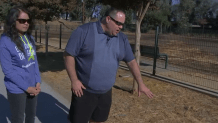When Daniel and Rhoda Sicotte pulled up to Watson Dog Park in early October they saw something they had never seen before: an orange residue covering the ground and sidewalks of the enclosures. They say there were no notices about what the substance was, and some visitors’ pets were covered up to their necks.

NBC Bay Area’s Investigative Unit looked into the incident and found out San Jose’s Parks Department uses several herbicides – including Roundup – to maintain its dog parks and public spaces. And public records show that many cities in the Bay Area continue to use the chemical despite California labeling it as potentially carcinogenic.
“Our daughter is 12 now but she’s been coming here with us to this dog park, this same dog park, since shew as a toddler,” said Daniel Sicotte. “So she has been running around in this chemical, as well as our dogs.”
While the orange residue on the grass was not Roundup, a glyphosate-based herbicide, city officials acknowledged that it was used on the perimeter of the enclosures and along the walkways – a practice they say has since stopped since NBC Bay Area began its investigation. An official with the department says the new policy bans the use of the chemical within 100 feet of dog parks and children’s areas.
Like many cities around the country, San Jose has been using glyphosate-based herbicides such as Roundup since the 1980s, and public records show that over the last two years contractors working for San Jose’s Parks Department have applied more than 380 gallons of Roundup across its 3,000 acres of parks.
The department is far from an outlier. Records show that 85 percent of cities in Santa Clara County continue to use the chemical for weed abatement in public parks, despite the county banning it’s use earlier this year on the land it has jurisdiction over.
News
Why does this matter?
Luoping Zhang, an adjunct professor of Toxicology at UC Berkeley’s School of Public Health says that research indicates exposure to glyphosate-based herbicides like Roundup increase the risk of getting Non-Hodgkin’s Lymphoma, a cancer that attacks the lymphatic system.
“Our data actually really suggested and really showed there’s a link,” said Zhang. “And we did see an increased cancer risk in humans.”
We feel the strongest association of human exposure is linked to the Non-Hodgkin's Lymphoma. That's from the data we see.
Luoping zhang
California’s Environmental Protection Agency and the World Health Organization agree, labeling the chemical as a probable carcinogen, or chemical that causes cancer.
In the last 16 months, three Bay Area juries have ruled against Monsanto, the maker of Roundup, awarding tens of millions of dollars to people who allege the weed-killer has caused their cancer. Monsanto has appealed the cases and maintains their product is safe, citing the United States’ Environmental Protection Agency’s position that it is “not likely to be carcinogenic to humans.”
Monsanto did not respond to NBC Bay Area’s requests for comment.
John Ciricelli, director of San Jose’s department of Parks, Recreation and Neighborhood Services, says that their use of glyphosate-based herbicides is highly regulated by the EPA and state, but his department is aware of the confusion and concern from the public.
“We definitely hear the message from the community that there is concern, regardless of what the EPA or anybody else says,” he said, adding that the department is working on finding alternatives to its use of Roundup and plans to phase the herbicide out at some point in the near future.
But for the Sicottes, that’s too long of a wait. They think the city should immediately discontinue the practice.
“Our daughter has been exposed to this, we’ve been exposed to this, our dogs have been and countless, countless other families have been exposed to it,” said Daniel.


